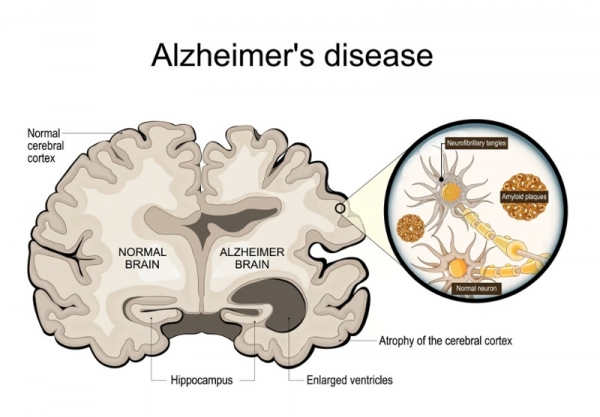Drinking alcohol, not getting enough sleep, stress, hypothyroidism, liver disorders, brain tumors, pregnancy, and depression can all lead to dementia.
Forgetfulness is more common with age, however, young people can also experience memory loss due to many causes such as lifestyle factors, medical conditions, and medication.
Aging
The brain undergoes changes as people age that can affect memory. Specifically, there is a decline in the hippocampus (the area of the brain involved in forming and retrieving memories); a decline in hormones and proteins that protect, repair, and stimulate the growth of brain cells; reduced blood flow to the brain, reducing cognition and memory; and loss of gray matter (brain tissue).
Forgetfulness due to age-related brain changes often includes occasionally forgetting where you put things like your phone, keys, glasses, etc.; forgetting someone's name or confusing someone else's; being easily distracted; taking longer to learn new things.
Lifestyle factors
According to the National Institute on Aging, several aspects of life can affect cognitive health and dementia.
Not getting enough sleep : Too little and too much sleep both affect memory. Sleeping an average of 7 hours a day helps maintain better memory.
Drinking too much alcohol : Alcohol can shrink the hippocampus, an area of the brain important for memory and affects both short-term and long-term memory.
Stress : Psychological stress can interfere with the formation of new memories and the recall of old ones.
Grief : Brain function can change as it processes traumatic events, impairing memory, decision-making, attention, and information processing.
Poor diet : Eating too much cholesterol and fat can cause brain damage similar to Alzheimer's. The Mediterranean diet, which is rich in whole grains, fruits and vegetables, nuts, beans and extra virgin olive oil, has been linked to a lower rate of dementia.

Eating lots of whole grains, beans, and nuts is good for your memory. Photo: Mai Cat
Pathology
Alzheimer's Disease : The most common cause of dementia and forgetfulness is Alzheimer's disease. The disease occurs in the areas of the brain that control thinking, memory, and language.
Parkinson's disease : Parkinson's is a neurological movement disorder that can progress to dementia.
Amyotrophic lateral sclerosis : This disease affects nerve cells. It initially causes muscle and movement symptoms, then progresses to cause forgetfulness, other cognitive problems, and sometimes dementia.
Brain tumors : Tumors in the brain that press on nerves can lead to problems with memory, thinking, reasoning, concentration, and language skills.
Blood clot in the brain : A blood clot blocks blood flow to brain tissue, potentially causing cognitive impairment called vascular dementia.
Brain infections : Infections such as Lyme disease (a tick-borne infection), HIV, and syphilis can damage the brain, causing forgetfulness and short-term memory loss.
Fibromyalgia : This is a condition characterized by pain throughout the body accompanied by sleep, cognitive, and mood disturbances.
Myalgic encephalomyelitis and chronic fatigue syndrome: These two conditions cause cognitive dysfunction, characterized by forgetfulness, which may be worse after exertion.
Attention deficit hyperactivity disorder : The brain of a person with attention deficit hyperactivity disorder lacks the ability to store and retrieve memories, so they often forget things.
Head injury : Head injury causes brain damage that results in reduced or lost ability to remember events that occurred before the injury.
Stroke : Forgetfulness, especially short-term memory loss, can also be caused by a stroke or a transient ischemic attack (mini-stroke).
Autoimmune diseases : Lupus and other autoimmune diseases sometimes cause people to have memory loss and other cognitive problems.
Hypothyroidism : Decreased thyroid hormone production alters energy metabolism in the brain, leading to cognitive dysfunction.
Kidney disease : Kidney disease and dementia both involve abnormalities in small blood cells, so people with kidney disease sometimes become forgetful.
Liver disorders : Liver disease can lead to a condition called hepatic encephalopathy, which causes memory loss and other cognitive problems.
Pregnancy : Cognitive problems, including memory loss, are common during pregnancy. This is because cognitive function is affected by increased levels of sex hormones during pregnancy, mainly during the second and third trimesters.
Mental health conditions : Anxiety, depression, bipolar disorder, schizophrenia are also factors. Physical changes in the brain interfere with concentration and short-term memory.
Use medicine
Some prescription medications can cause forgetfulness, especially those that affect brain function or chemistry. Examples include antidepressants, chemotherapy drugs, etc.
Mai Cat (According to Very Well Health )
| Readers ask questions about neurological diseases here for doctors to answer |
Source link





![[Photo] Summary of parade practice in preparation for the April 30th celebration](https://vstatic.vietnam.vn/vietnam/resource/IMAGE/2025/4/11/78cfee0f2cc045b387ff1a4362b5950f)

![[Photo] Looking back at the impressive moments of the Vietnamese rescue team in Myanmar](https://vstatic.vietnam.vn/vietnam/resource/IMAGE/2025/4/11/5623ca902a934e19b604c718265249d0)























































































Comment (0)